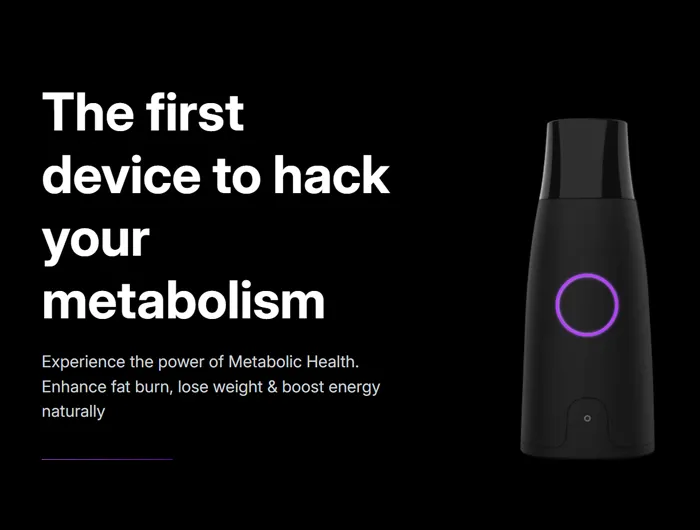Can you ‘hack your metabolism’ with Lumen?

“Breathe into your Lumen to get a real-time view of whether you’re burning mostly fat or carbs,” says the website of the metabolism-measuring device and personalized diet subscription service. Why? “So you can understand the impact of your lifestyle on your metabolism.” Spoiler: It’s not clear that understanding your metabolism translates into any health benefit.
What is Lumen?
Lumen is a handheld device (similar in appearance to a vape pen) that you breathe into every day. It estimates how much fat and carbs you’re burning by measuring the amount of carbon dioxide you exhale (a method called indirect calorimetry). More carbon dioxide means you’re burning more carbs.
Does it work? Two studies—both at least partly funded by Lumen’s parent company and partly authored by its employees—have looked.
In one, the Lumen device worked reasonably well compared to the gold standard method for measuring how much fat and carbs you’re burning, though the study only included 33 young people. Another small study found that the device could pick up on differences in exhaled air when people followed a low-carb or a high-carb diet for a week.
Translation: The Lumen device can apparently do what it claims with reasonable accuracy, keeping in mind that the research was conducted at least in part by company employees.
Lumen runs the data its device collects through an algorithm that provides app-based services like “tailored nutrition plans updated daily, macro tracking and meal suggestions, and metabolic coaching and support.”
To be clear, Lumen isn’t just a weight-loss program. The company also has “tracks” that offer advice to boost metabolic health or fitness performance, though its website provides no evidence that tinkering with carb intake will improve either of those.
It’s also important to keep in mind what Lumen can and can’t do. For example, it’s only measuring whether you’re primarily using carbs or fat as fuel. It can’t (and doesn’t claim to) tell you how many calories you’re burning. And it also can’t distinguish between whether the fat you’re burning is body fat or fat from your diet. So a score that reflects a high fat burn might just mean you’re eating a high-fat diet, not burning off your body’s fat stores.
And Lumen doesn’t come cheap. For $349, you get the device plus a three-month subscription. Or you can cough up $589 for the device plus a 12-month subscription. (The company often offers deals that bring the cost down.)
Is the Lumen program easy to follow?
Lumen keeps the curtain drawn. It’s not clear how the company uses the data it collects from your breath to make its recommendations or what evidence its approach is based on.
Nor does Lumen’s website reveal much about what users have to do to follow the program. But reviews from people who have tried it suggest that it’s not as simple as breathing into the Lumen device and getting some diet advice.
One thing is clear: Lumen is no quick fix. You have to be diligent about using it. Lumen only requires you to use the device first thing in the morning in order to receive guidance, though it also encourages you to give samples before and after exercise and eating. After two weeks of measurements, the app will give you a “Flex score,” which tells you how flexible your metabolism is (more on that below).
As many users reported, you have to track everything you eat in order for the program to work optimally, a time-consuming exercise that can feel cumbersome. And, despite study after study showing no benefit of low-carb diets over low-fat diets for weight loss, many of Lumen’s recommendations tend to limit carbs, users say.
Does Lumen help people lose weight?
In one study (co-authored by employees of—and funded by—Lumen’s parent company), 27 adults with excess weight used the Lumen device every morning. The volunteers were then given instructions about their diet for the day, which typically meant following a low-to-moderate-carbohydrate diet (about 20 to 45 percent of calories from carbs, depending on each day’s Lumen results) and eating about 500 calories less per day than “estimated requirements.”
After 12 weeks, the volunteers had lost an average of 13 pounds and had lowered their hemoglobin A1c (a long-term measure of blood sugar).
But those results may just mean that cutting 500 calories a day leads to weight loss. (No surprises there.) Because there was no “control” group that cut calories but didn’t use Lumen, the study doesn’t tell us whether Lumen had any impact on weight.
Lumen is not metabolism magic
Lumen claims that its program helps you “hack your metabolism.”
This premise hinges on the concept of metabolic flexibility, which is the body’s ability to efficiently switch between burning mostly fat when fasting, at rest, or engaging in low-intensity activity or prolonged exercise, and burning mostly carbohydrates after eating or higher-intensity exercise. Some studies suggest that people with obesity or type 2 diabetes have reduced metabolic flexibility, meaning their bodies are sluggish in shifting between fuel sources.
That could mean, for example, that after you eat a meal your body struggles to turn the carbs you ate into fuel, which could result in prolonged high blood sugar levels.
But it’s not clear that knowing how metabolically flexible you are adds much insight into your health. Part of the problem is a classic chicken-and-egg conundrum. Metabolic inflexibility often occurs hand-in-hand with insulin resistance (difficulty moving sugar from your blood into cells). But it’s not clear if metabolic inflexibility causes insulin resistance…or if it’s the other way around.
Some researchers suggest that signs of metabolic inflexibility may precede markers of worsening metabolic health like high blood sugar and insulin resistance, but more research is needed to flesh that out.
What’s more, there is no single test that captures metabolic flexibility. Nor is there an agreed-upon threshold that signals when someone has crossed into “inflexible” territory. And many studies measure and define metabolic flexibility differently, making it challenging to compare their results.
All of that makes us suspicious of Lumen’s “Flex score,” which claims to tell users how metabolically flexible they are. The same goes for Lumen’s assertions that better metabolic flexibility means easier weight loss, better sleep, an optimized workout performance, more lean mass, and feeling more energized and less sluggish.
Too bad there’s no good evidence to support any of those claims.
Bottom line
Skip the expensive metabolism “hacks.” There’s no good evidence that focusing on metabolic flexibility will lead to better sleep, better workouts, more energy, or more weight loss or muscle.
Tags
Topics
Support CSPI today
As a nonprofit organization that takes no donations from industry or government, CSPI relies on the support of donors to continue our work in securing a safe, nutritious, and transparent food system. Every donation—no matter how small—helps CSPI continue improving food access, removing harmful additives, strengthening food safety, conducting and reviewing research, and reforming food labeling.
Please support CSPI today, and consider contributing monthly. Thank you.
More on fact vs fiction
The FDA no longer warns against ineffective autism treatments
Government Accountability
By ProPublica

Folic acid is the best choice for a healthy pregnancy
Fact vs. Fiction

What the science says about Tylenol and autism
Fact vs. Fiction

Is beef tallow really healthier than seed oils?
Fact vs. Fiction

Trump distorts facts on autism, Tylenol, and vaccines, scientists say
Government Accountability


